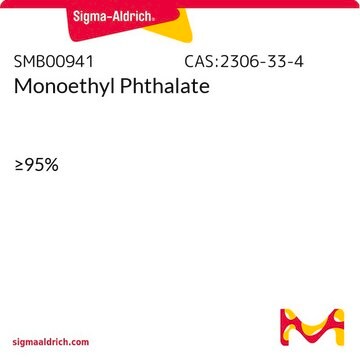30751
mono-Butyl phthalate
analytical standard
Synonym(s):
MBP, Phthalic acid butyl ester, mono-n-Butyl phthalate
About This Item
Recommended Products
grade
analytical standard
Quality Level
shelf life
limited shelf life, expiry date on the label
technique(s)
HPLC: suitable
gas chromatography (GC): suitable
application(s)
cleaning products
cosmetics
environmental
food and beverages
personal care
format
neat
SMILES string
CCCCOC(=O)c1ccccc1C(O)=O
InChI
1S/C12H14O4/c1-2-3-8-16-12(15)10-7-5-4-6-9(10)11(13)14/h4-7H,2-3,8H2,1H3,(H,13,14)
InChI key
YZBOVSFWWNVKRJ-UHFFFAOYSA-N
Looking for similar products? Visit Product Comparison Guide
Application
Recommended products
Signal Word
Danger
Hazard Statements
Precautionary Statements
Hazard Classifications
Repr. 1B
Storage Class Code
6.1C - Combustible acute toxic Cat.3 / toxic compounds or compounds which causing chronic effects
WGK
WGK 3
Flash Point(F)
Not applicable
Flash Point(C)
Not applicable
Choose from one of the most recent versions:
Already Own This Product?
Find documentation for the products that you have recently purchased in the Document Library.
Customers Also Viewed
Our team of scientists has experience in all areas of research including Life Science, Material Science, Chemical Synthesis, Chromatography, Analytical and many others.
Contact Technical Service


![mono-[(2RS)-2-Ethyl-5-oxohexyl] phthalate analytical standard](/deepweb/assets/sigmaaldrich/product/structures/380/975/47f8fcbc-594c-4f9c-84df-43685552cd06/640/47f8fcbc-594c-4f9c-84df-43685552cd06.png)







